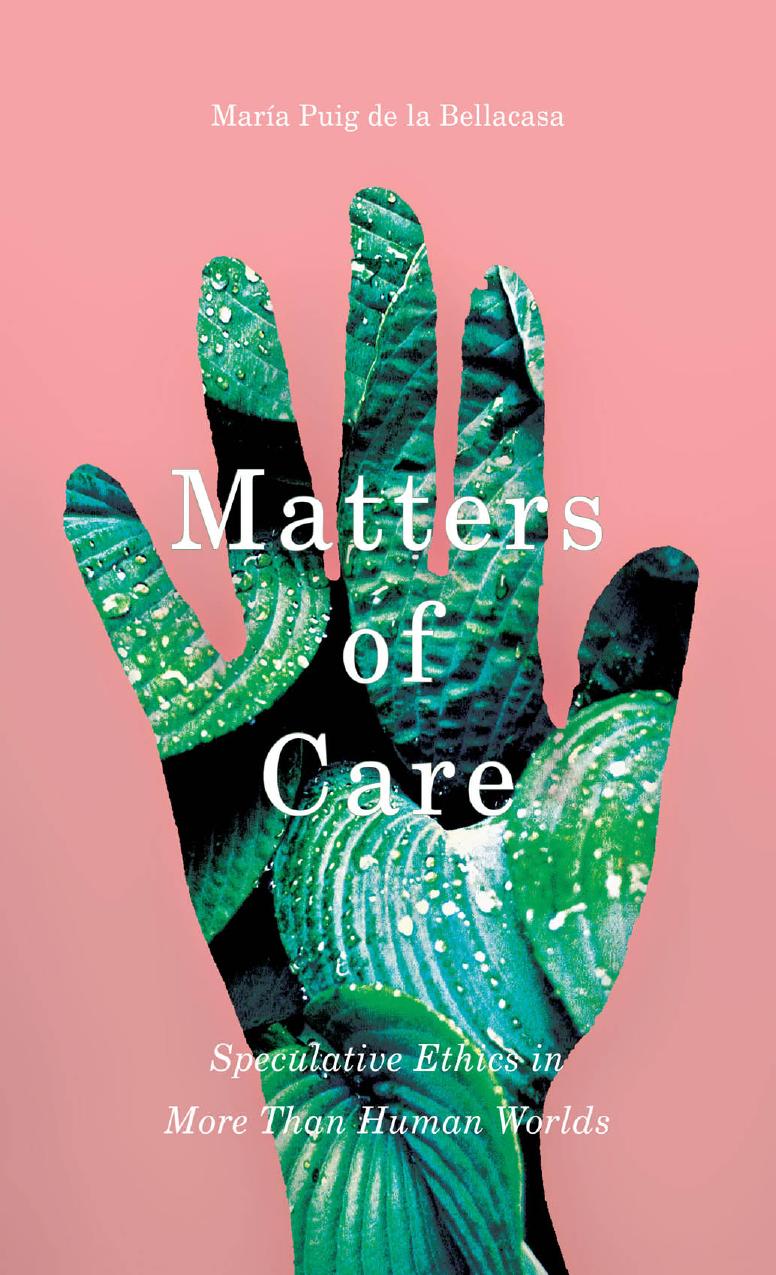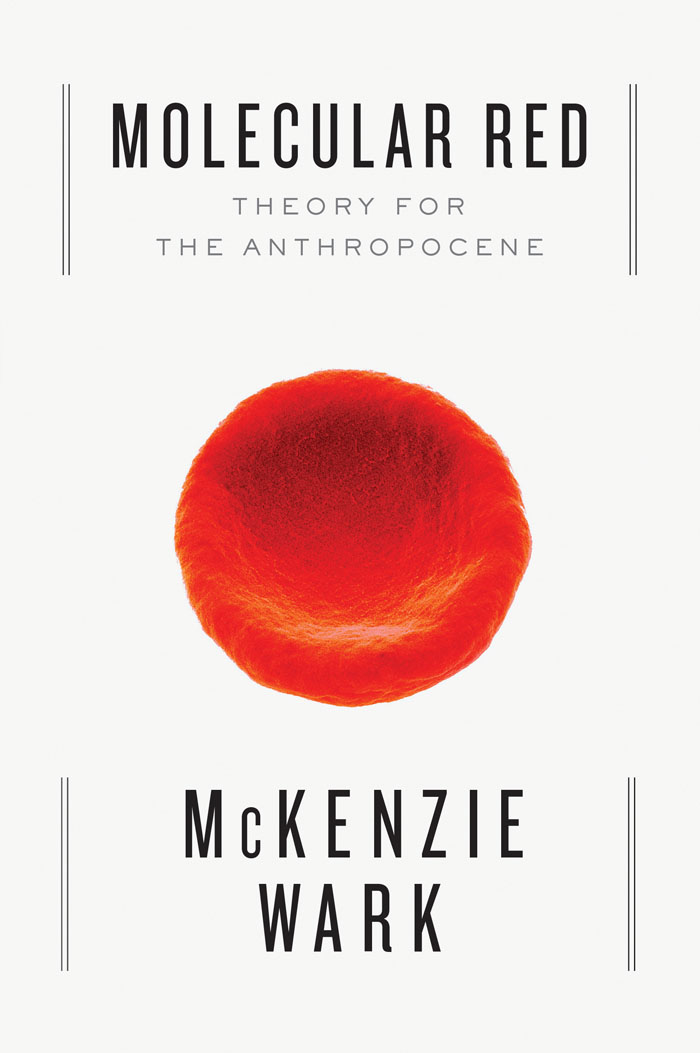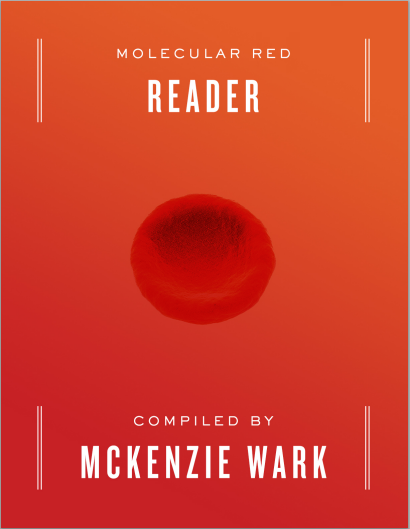María Puig de la Bellacasa: Matters of Care: Speculative Ethics in More than Human Worlds (2017)
Filed under book | Tags: · agency, biopolitics, care, ecology, ethics, feminism, knowledge, naturecultures, object, politics, soil, technoscience, touch

“To care can feel good, or it can feel bad. It can do good, it can oppress. But what is care? A moral obligation? A burden? A joy? Is it only human? In Matters of Care, María Puig de la Bellacasa presents a powerful challenge to conventional notions of care, exploring its significance as an ethical and political obligation for thinking in the more than human worlds of technoscience and naturecultures.
Matters of Care contests the view that care is something only humans do, and argues for extending to non-humans the consideration of agencies and communities that make the living web of care by considering how care circulates in the natural world. The first of the book’s two parts, “Knowledge Politics,” defines the motivations for expanding the ethico-political meanings of care, focusing on discussions in science and technology that engage with sociotechnical assemblages and objects as lively, politically charged “things.” The second part, “Speculative Ethics in Antiecological Times,” considers everyday ecologies of sustaining and perpetuating life for their potential to transform our entrenched relations to natural worlds as “resources.”
From the ethics and politics of care to experiential research on care to feminist science and technology studies, Matters of Care is a singular contribution to an emerging interdisciplinary debate that expands agency beyond the human to ask how our understandings of care must shift if we broaden the world.”
Publisher University of Minnesota Press, Minneapolis, 2017
Posthumanities series, 41
ISBN 9781517900656, 1517900654
265 pages
Reviews: Miriam Ticktin & Katinka Wijsman (Hypatia, 2017), Sonja Jerak-Zuiderent (Science & Technology Studies, 2017), James McMaster (Women & Performance, 2017), Kelly Dombroski (Journal of Cultural Economy, 2018), Stephen Healy (Journal of Cultural Economy, 2018), Elizabeth Reddy (Journal of Cultural Economy, 2018), Gerda Roelvink (Journal of Cultural Economy, 2018), Maria Puig de la Bellacasa (response, Journal of Cultural Economy, 2018), Katie Ulrich (Cultures of Energy, 2018), Garrett Bunyak (Configurations, 2018), Sarah Weiger (ISLE, 2019), Farhan Samanani (Society+Space, 2019), Richard Brons (Ethics of Care, 2019).
Commentary: Michelle Murphy (Social Studies of Science, 2015).
Interview with author (Cultures of Energy, 2018, 70 min)
Comment (0)Judy Wajcman: TechnoFeminism (2004–) [EN, ES]
Filed under book | Tags: · cyberfeminism, cyberspace, cyborg, feminism, gender, sexuality, sociology, technology, technoscience, women

“This timely and engaging book argues that technoscientific advances are radically transforming the woman-machine relationship. However, it is feminist politics rather than the technologies themselves that make the difference. TechnoFeminism fuses the visionary insights of cyberfeminism with a materialist analysis of the sexual politics of technology.”
Publisher Polity Press, 2004
ISBN 9780745630441, 0745630448
viii+148 pages
Reviews: Martha McCaughey (American Journal of Sociology, 2006), Lucy Suchman (Social Studies of Science, 2006), Rosalind Gill (Science as Culture, 2005), Sarah M. Brown (NWSA Journal, 2007), Eva Patricia Gil (UOC Papers, 2007, Spanish), Isabel Clúa (n.d., Spanish).
Wikipedia (EN)
Publisher (EN)
WorldCat (EN)
TechnoFeminism (English, 30 MB)
El tecnofeminismo (Spanish, trans. Magalí Martínez Solimán, 2006, via)
See also Wajcman’s Feminism Confronts Technology, 1991.
Comment (0)McKenzie Wark: Molecular Red: Theory for the Anthropocene (2015)
Filed under book | Tags: · agriculture, anthropocene, climate, climate crisis, communism, cyborg, environment, knowledge, labour, literary criticism, marxism, nature, philosophy, production, proletariat, proletkult, revolution, science, science fiction, technoscience, tektology, theory, utopia


“In Molecular Red, McKenzie Wark creates philosophical tools for the Anthropocene, our new planetary epoch, in which human and natural forces are so entwined that the future of one determines that of the other.
Wark explores the implications of Anthropocene through the story of two empires, the Soviet and then the American. The fall of the former prefigures that of the latter. From the ruins of these mighty histories, Wark salvages ideas to help us picture what kind of worlds collective labor might yet build. From the Russian revolution, Wark unearths the work of Alexander Bogdanov—Lenin’s rival—as well as the great Proletkult writer and engineer Andrey Platonov.
The Soviet experiment emerges from the past as an allegory for the new organizational challenges of our time. From deep within the Californian military-entertainment complex, Wark retrieves Donna Haraway‘s cyborg critique and science fiction writer Kim Stanley Robinson’s Martian utopia as powerful resources for rethinking and remaking the world that climate change has wrought. Molecular Red proposes an alternative realism, where hope is found in what remains and endures.”
Publisher Verso, London and New York, March 2015
ISBN 1781688273, 9781781688274
xxiv+280 pages
Reviews: Slavoj Žižek (Verso 2015, Wark’s response), John Beck (Radical Philosophy 2015), Mark Rappolt (ArtReview 2015), Maria Chehonadskih (Mute 2015, Wark’s response), Two Grenadiers (2015), Pieter Vermeulen & Tom Chadwick (nY 2016), Jim Harper (LSE Review of Books 2016).
Commentary: Joe Guinan (Renewal 2015), Jernej Kaluža (Radio Student 2019, SL).
Video lecture (Concordia U, Apr 2015)
Publisher
WorldCat
See also Molecular Red Reader compiled by Wark (PDF).
Comment (0)
